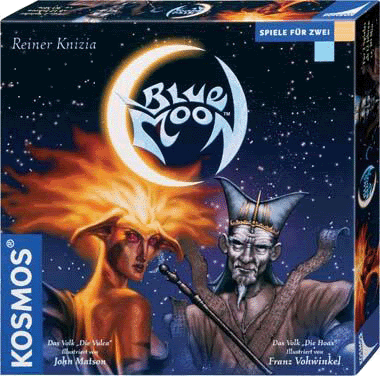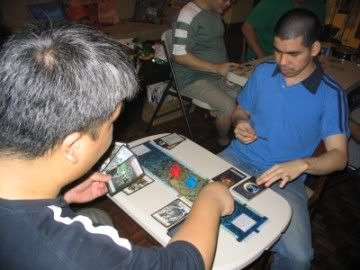In Blue Moon, each player takes a deck of cards built around one of the races on the world of Blue Moon. The races are fighting for control of dragons, which in turn determine supremacy on Blue Moon. Thus, the game is a series of battles between characters, with each victory attracting a dragon away from the enemy or to the side of the winner.

The base game includes two races, the Vulca and the Hoax. The Vulca are a fire-oriented race, very strong and direct in battle. The Hoax seem to be a magic-wielding race that fight with guile more than brute force. The cards are oversized and printed on thick cardstock. The artwork is very nice, at par with good CCG artwork. Also included in the square, flat linen-finished box is a linen-finished game board with labeled areas of play and a turn sequence guide. Finally, there are three identical plastic dragons of different colors. These are very nicely done. The game could have been done in a more portable form factor, as the dragons and board aren’t really necessary. If the cards were printed in the usual size, the whole game would have fit in a package a third of the size. However, one can’t deny that the whole package is very attractive and makes the game distinct from its CCG ancestors.
The Game
The basic framework of a game of Blue Moon is simple. Players shuffle their 30-card decks into a draw pile. Each draws a hand of six cards. The beginning player declares that he is starting a battle, then plays a character card. The character card has two combat values, one in Fire and another in Earth. The player chooses one of the two elements to battle in. The player announces his attacking power. If the character has any special text, that text is read out and the effects applied. The player then draw back up to six cards and ends his turn.
The opponent then must match or exceed the attacker’s power in the element by playing his own character, plus either a booster or support card. The booster is a card attached to the character, and the support is a card that applies to the whole battle. Both types of cards have special effect text, elemental power, or both. Power is added to the character’s power, and the total is the attacking power that now must be matched or exceeded by the opponent.
This goes back and forth until one player is unable to match the requisite power, in which case he is forced to retreat. It's not that simple, of course, as there are nuances as to when to retreat even when you can continue the fight. In addition, special card texts can influence a decision to all the opponent a win at that moment. When a player retreats, his opponent wins the battle and attracts a dragon. The first player to attract an additional dragon when he already has three dragons wins. Alternatively, if a player runs out of cards, whichever player has the most dragons attracted wins. If there is a ties, the player who ran out of cards first loses the battle.

Strategy
The main interest in the game is in the interactions between cards, usually through the special text or symbols. Examples of various effects are doubling of power, raising power to a specific number, elimination of an opponent’s support cards, prohibiting your opponent from playing specific types of cards, attracting or preventing the attraction of dragons, and changing of the element of battle.
As in many CCGs, timing of card play is important in Blue Moon. In the base set, the Hoax are dependent on timing and interaction of effects. This race is inherently more difficult to play than the comparatively straightforward Vulca. The Vulca can win just by spitting out cards in a Fire battle. Another common CCG trait present in Blue Moon is deck management. Since the first player to run out of cards loses the game, if you can get your opponent to use a lot of cards without ceding all three dragons to him, you should be able to win by decking.
Reviewer’s Tilt
There really isn’t anything in Blue Moon that hasn’t been seen in other CCGs before. The game is essentially a repeating battle between two preconstructed decks, and the entertainment value of such a package has a limited ceiling. Thus, player hoping to find an enduring two player game with high replayability, similar to Knizia’s other two player games like Lost Cities, Schotten-Totten or The Lord of the Rings: The Confrontation, may be disappointed.
Blue Moon may have some appeal to gamer parents wishing to introduce their younger kids to an introductory game for more complex CCGs like Magic: the Gathering. Blue Moon teaches simple timing and interaction concepts that are taken to a far more advanced level in Magic.
There is no deck construction to speak of in Blue Moon, until some of the expansion races are bought. However, this raises the price point for the game and brings it closer to the CCG structure, which some people were trying to avoid in the first place. If one is going to play a CCG type card game and the total cash outlay is going to be more than a few dollars, then searching eBay for large lots of cheap CCG cards may be a viable alternative. Needless to say, veterans of CCGs (particularly those who have played a game like Magic: the Gathering at tournament level) will likely be bored with Blue Moon’s simplicity.
Blue Moon may also have appeal to people who have never tried CCGs for some reason. Then the ideas in the game may seem fresh and interesting, and the interest may be held for a longer period of time. As such, this is the only read audience that I can recommend the game to.
1 comment:
great post i like it thanks for sharing it .
duck life 2
vex 3
fnaf 4
Post a Comment